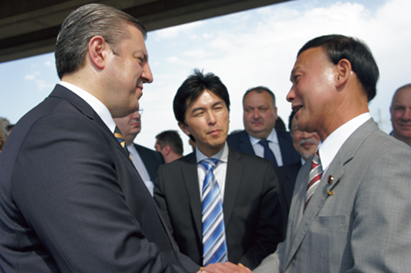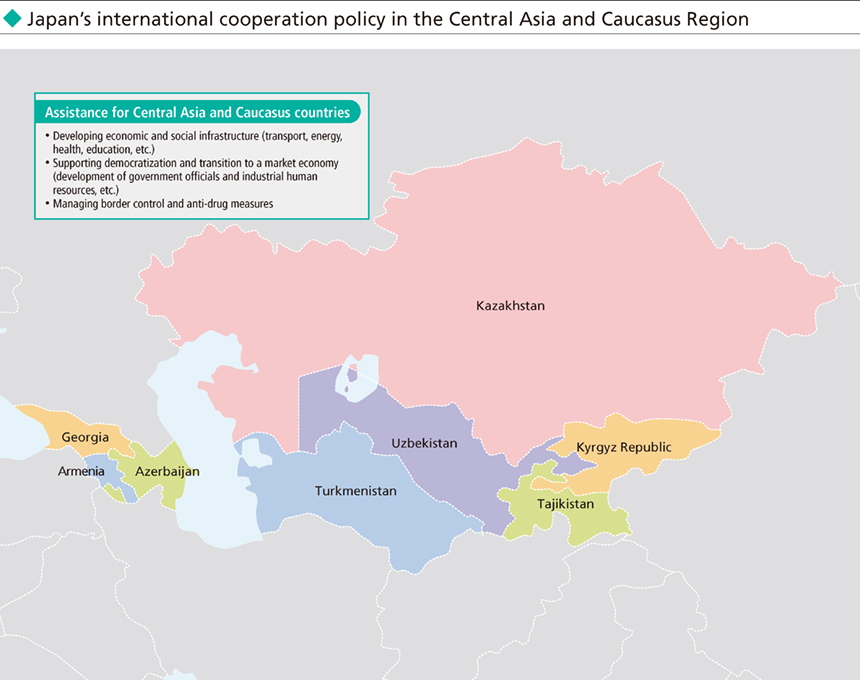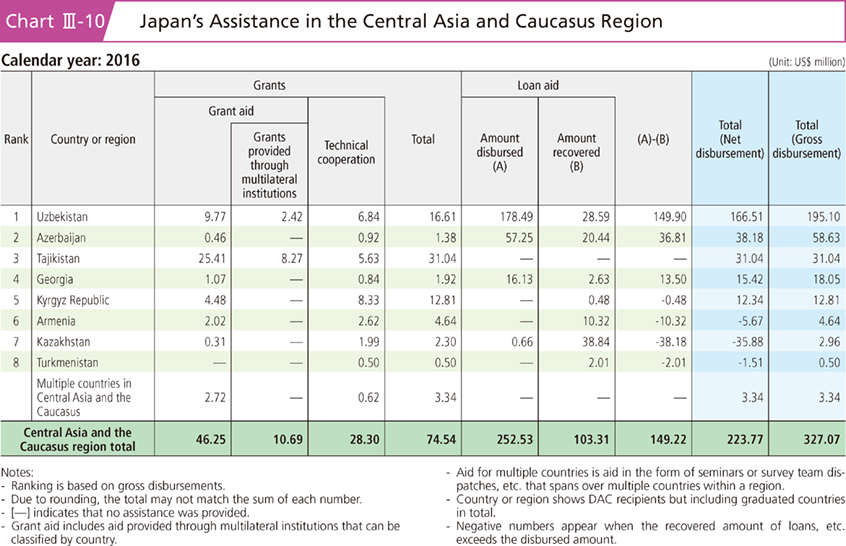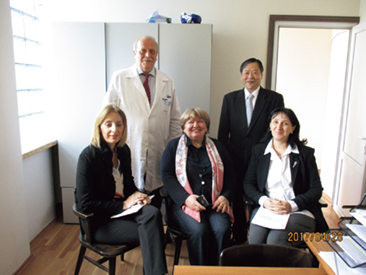3. Central Asia and Caucasus
Central Asia and Caucasus are areas of geopolitical importance, since they are surrounded by Russia, China, South Asia, the Middle East, and Europe, and the stability and development of these regions significantly affect those of the Eurasian region as a whole. These regions are also of strategical importance for Japan, whose diplomacy in the area of resource and energy is aiming to diversify resource supply countries, because these regions include countries abundant of energy and mineral resources such as oil, natural gas, uranium, and rare metals. From this viewpoint, Japan has been supporting nation-building efforts for long-term stability and sustainable development in these regions, which is designed to establish the firm basis of universal values in the countries in these regions, such as human rights, democracy, market economy, and the rule of law, while taking into consideration a broader regional perspective which covers Afghanistan, Pakistan, and other neighboring regions surrounding Central Asia.
<Japan's Efforts>
Since the Central Asia and Caucasus countries' independence in 1991 following the collapse of the former Soviet Union, Japan has been providing assistance in diverse areas such as the improvement of infrastructure for economic development (socio-economic infrastructure), human resources development for the transition to a market economy, and the rebuilding of health and medical care and other social systems in order to support the efforts of each country towards the transition to market economies and economic development.
In May 2017, then Foreign Minister Kishida participated in the 6th Foreign Ministers' Meeting of the “Central Asia plus Japan” Dialogue held in Turkmenistan, and signed the Joint Declaration that symbolizes the broad range of cooperative relations between Japan and the Central Asian countries, in various matters including North Korean issues. He also announced the “Initiative for Cooperation in Transport and Logistics” which sets out the direction for cooperation till now and in the future, in the fields of transport and logistics, based on the belief that strengthening mutual connectivity within and outside the region as a prioritized and practical field of future cooperation can contribute to the development of the region. Under this initiative, he expressed that Japan would be providing support amounting to approximately ¥24 billion. For example, Japan's assistance towards road improvement and disaster risk reduction measures (including landslide countermeasures) through the International Main Roads Improvement Project for the Kyrgyz Republic under this initiative is expected to improve road transportation capability and safety. Furthermore, Japan expressed its intention to accept 2,000 trainees in the next five years. By 2016, Japan has accepted 10,270 trainees from Central Asia and Caucasus, and dispatched 2,303 experts to the region. Japan has also been providing support in the development of the human resources necessary for new nation-building efforts, including the implementation of the Project for Human Resource Development Scholarship, which is a study-in-Japan program for young government officials, and the development of human resources for business through Japan Center for Human Resources Development.
Considering the importance of cooperation among countries in this region which are facing common issues, Japan promotes regional cooperation in areas of border control, counter-terrorism and anti-drug measures, disaster risk reduction, and agriculture. Apart from these efforts, Japan provided election-related equipment to the Kyrgyz Republic which is eagerly advancing its process of democratization. This equipment was effectively used in the 2015 parliamentary election and the 2017 presidential election, which facilitated the peaceful elections without any major confusion and consequently contributed to more solid establishment of democracy in the country.

In June 2017, then Parliamentary Vice-Minister for Foreign Affairs, Motome Takisawa, visited Georgia and held a dialogue with Prime Minister Giorgi Kvirikashvili.


•Georgia
Japan's Non-Project Grant Aid for Introduction of Japanese Advanced Products and Its System (Medical Equipment and Welfare Apparatus Package)
Non-project grant aid (FY2014)

Director Gvamichava (left back row), Ambassador Toshio Kaitani (back row right), and Ms. Marina whose lung cancer was then cured by early detection (middle front row)
In Georgia, a country with a population of 4 million people and land size about one-fifth of Japan, many people have difficulty in accessing high quality medical services due to obsoleted medical equipment of hospitals. To improve this situation, Japan provided high quality Japanese medical equipment (CT, digital X-ray equipment, ultrasonic diagnostic devices, etc.) for two hospitals in Georgia as well as 140 AEDs* (automatic external defibrillators) for emergency use throughout Georgia as part of this grant aid. The handover ceremony was held in April 2017.
On the day of the handover ceremony, Mr. Toshio Kaitani, Japanese Ambassador to Georgia (title at that time), visited Universal Medical Center and met a woman whose early stage lung cancer was detected by the CT provided by Japan. She was fully recovered from the cancer and expressed her heartfelt appreciation to the Ambassador. The Director of the Center mentioned that she was the first case who was saved by the CT provided by Japan, and without it early detection would not have been possible.
At the handover ceremony, Mr. Davit Sergeenko, the Minister of Health, Labour and Social Affairs of Georgia expressed his gratitude for Japanese aid because the AEDs have increased the rate of patient survival by above 70%.
By providing the products made by Japanese companies, it is expected that Japanese businesses overseas will be promoted and economic relationship between the two countries will be strengthened.
*A medical device used to restore normal heart rate through electric shocks in case of cardiac arrest.
